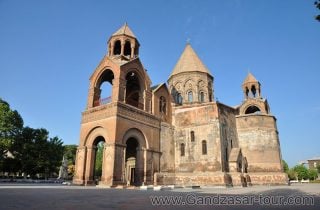
Recognition of the Armenian Genocide by the Brazilian State: a Democratic and Humanitarian Need

(Professor Flávio de Leão Bastos Pereira – Attorney at Law, Professor of Constitutional Law at Mackenzie Presbyterian University (São Paulo-Brazil); Master’s Degree in Political and Economic Law; Member of the International Network of Genocide Scholars – InoGS; Researcher at the Federal University of São Paulo (UNIFESP), at the Research Group of Wars, Massacres and Genocides of Contemporary Era; Professor Advisor at the Getúlio Vargas Foundation – Post-graduation in law (GVLaw), São Paulo, Brazil; Member of Inter-American Bar Association – IABA. E-mail: [email protected])
The Federative Republic of Brazil is constituted as a democratic state under the federal form of government, whose constitutional foundations are, among others, human dignity, political pluralism and that, in international relations, must observe and preserve the principle of self-determination of other sovereign states, besides compliance with the principles of national independence of the recognized nations, the prevalence of human rights, equality among states, peace advocacy, repudiation of racism, and the prevalence of cooperation among people for the progress of humanity, as enshrined in the Constitution of Brazil of October 5, 1988, especially in its Articles 1 and 4.
In addition to the above constitutional provisions, pursuant to paragraph 2nd, Article 5, of the same Constitution, international treaties are also protective normative sources of fundamental rights and principles to be followed by Brazil.
Considering these supreme guidelines in the constitutional and legal Brazilian system, therefore established in a supreme constitutional framework, in a position of supremacy over any other kind of norm, normative acts and decisions of the authorities, we find unjustifiable the position of the Brazilian government not to have recognized yet, as genocide, the terrible process of destruction of the Armenian people and culture, by the Turkish Ottoman Empire, between 1915 and 1923.
We demonstrate and believe that the legal and constitutional basis for such official recognition exists and is solid. It is not a legal, but a question of political will.
As Brazil adopted the federal model of governance as the US, Germany, Argentina, Mexico and many other countries, the Brazilian State is composed of the point of view of its political and organizational structure – the Union, the States of the Federation, the Federal District (where the capital city is located) and also by municipalities (equivalent to districts or provinces, in other countries).
Each State of the Brazilian Federation has financial, administrative, political and economic autonomy, with their own Constitutions (except the municipalities and the Federal District), which must be harmonious and must respect the principles of the Federal Constitution.
Due to these federal aspects, at least three states in Brazil have recognized the Armenian genocide: the first of them, the State of São Paulo, recognized in 2003; the second one, the State of Ceará – in 2006; and, in January of 2013 – the State of Paraná. Some of the municipalities have, also, recognized the genocide of the Armenian people by the Ottoman Empire.
Recently, in April 2015, the State of São Paulo established April 24th as the “Day of Recognition and Remembrance of the Victims of the Genocide Committed by Ottoman Empire”.
Therefore, part of the federal Brazilian states have, in the exercise of their federal autonomy, assumed their responsibility about building human rights, recognizing the truth and the establishment of memory, which are important stages in the consolidation of the reconciliation between Turkey and Armenia as an important step toward peace and democracy.
Peace is not possible in any country, which was governed by a genocidal, totalitarian or dictatorial regime, without the recognition of the truth and memory.
However, the Brazilian federal government (the Union), until now, has not recognized the massacres of Armenians committed by the Ottoman Turkish Empire, under the government of Young Turks, as it should be recognized: a genocide – the prototype of other genocides practiced along the twentieth century and early twenty-first century.
Such an omission charges the Federative Republic of Brazil, in our view, to assume their duties as a regional power in South America, especially, since the first country to do so was Uruguay, in the distant year of 1965.
It seems that the delay of the recognition of the Armenian genocide, by Brazil, finds explanations, at least in part, at the relationships established with the Turkish government in the commercial, military, cultural and diplomatic fields.
In fact, the inertia of the countries to prevent the occurrence of genocides such as a failure to condemn dictatorial or totalitarian regimes, pursue the maintenance of diplomatic relations with such regimes, etc., is part of the established denial techniques, which are primarily developed by perpetrators’ regimes or revisionists.
Having the above in mind, we remember that despite the historical performance of US Ambassador Morgenthau, already during the Armenian genocide, today the United States avoid using the word “genocide” in the case of the Armenian people’s tragedy and their extermination by the Ottomans.
Contemporary Turkey, a NATO member, is very persuasive in “reminding” the United States about their interests represented by Erdogan’s government.
An important example in this context is the military air base of Incirlik, Turkey, which is one of the largest American military bases outside the US territory.
Brazil does not escape this logic either.
For example, although Turkey is not the main trading partner of Brazil, trade between the two countries is growing every year. If we consider the present fragility of the Brazilian economy, we conclude that Brazil does not want to risk the loss of such a partner.
According to the Ministry of Development, Industry and Foreign Trade of Brazil (MDIC), trade between the two countries rose from $ 530 million in 2004, to US $ 2.102 billion in 2013 (http://www.brasilturquia.com.br/comercio-bilateral-brasil-turquia-302.html).
One of the important factors that fuels the policy of denialists is the use of conditioning business relationships speech, diplomatic, military and related interests. In case of Turkey not recognizing the Armenian genocide, this is an effective denier weapon that perpetuates the most obvious injustice in the face of the Armenian people and even the Turkish people because in the future too they will have to bear the emotional and historical burden of responsibility for genocide.
Brazil and its federal government must recognize the Armenian genocide and respect the will of the Brazilian people, as a democratic and pluralist nation.
During a recent conference on May 6-7, 2015, at the Mackenzie Presbyterian University, São Paulo, under our coordination, to discuss the genocide of the Armenian people and its legal, historical and religious aspects, in the presence of the Ambassador of the Republic of Armenia to Brazil, Mr. Ashot Galoyan, one of our law students told the Ambassador: “We, Brazilians, want the recognition of the moral duty of the murderer of the Armenian people, the Ottoman Empire, as a genocide. We, Brazilians, apologize for the omission of our government”.
This is the feeling of the majority of Brazilians – a nation that desires solid and real democracy.
It is worth mentioning that, unexpectedly and in a historical conduct, the German government, in addition to recognizing the Armenian genocide, also acknowledged their co-participation and role as an ally of Ottoman Empire at that time.
Brazil must observe this example in relation to the Armenian genocide and, also, towards the Brazilian dictatorship period (1964-1985), with coherence and respect to a real transitional justice.
Encouraging this commendable attitude of some States of the Brazilian Federation, as Paraná, Ceará and São Paulo, which officially have recognized the genocide of the Armenian people, contributed for Brazil to build the way for its destiny as a regional power and, in the future, as a world power (nowadays, Brazil is the sixth economy in the world, with the fifth largest territory in the world – 9.372,614 km²), and one of the largest democracies in the world.
More importantly, they contributed for Brazil to establish a stronger relationship with this great nation, of great importance to Brazilian Christians and democrats, as it is the Republic of Armenia.
We believe that the other states and the Federative Republic of Brazil, as the real and direct representative of their people, should follow these precedents of justice and recognize the Armenian genocide.
With this recognition, the Federative Republic of Brazil could implement the principles of its own Constitution and of the United Nations.























